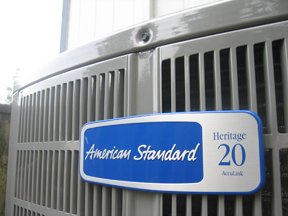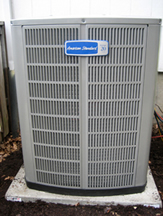Regular Heat Pumps and Air Conditioners
Portland Heat Pump and Air Conditioning Contractor
• Heat Pumps extract heat from the outdoor air |
• Our units run the best compressors in the industry |
|
|
Heat Pumps
We know a properly installed heat pump is a great way for homeowners to "green up" their house. Even below freezing there is enough energy in the outside air to heat your home. It takes very little energy to move that heat from outside to inside. When Summertime hits, the unit reverses it's flow and pulls the heat out of the house. It's an Air conditioner too.
Traditional Ducted Heat Pumps need a furnace indoors to push the heat or cool around the house. In the very cold weather the heat pump will need help from the indoor furnace or "back up heat". You can use electric, gas or oil furnaces to back up a heat pump. Depending on the the capacity of the heat pump system the point at at which the back up heat kicks in will vary. The more capacity or BTU's the unit produces the colder it can be before back up heat kicks in. Just tossing BTU's at the problem isn't a fix all. Heat Pumps match air flow to the BTU's so the higher the BTU output the higher the air flow. We don't want to create a wind tunnel in your home in an effort to keep the back up heat off. It's a happy medium. Luckily Oregon is a mild climate and perfect region for Heat Pumps. Don't be scared of the back up heat.
When you hunt for a Heat Pump you'll find many units are listed by their SEER rating. This an industry rating that applies to Air Conditioning. For the efficiency rating of the heat side of a heat pump you look for the HSPF rating. That will be numbers between 7.8 and 10. If you are going to go to the effort to buy a heat pump, go to the effort to find a rating of 9 HSPF or higher.
Air Conditioining
Because Oregon has such a mild Summer I don't push as hard for our clients to get the "green" A/C's, meaning the A/C's with the high SEER ratings. The logic here being that the energy savings is so minimal on your electric bill, that the extra money you paid out to upgrade to a high SEER unit gets returned to your wallet, just about the time the unit conks out and needs to be replaced. The math just doesn't pencil. It's like paying a ton extra for a car that gets great gas milage and then you park the car and never drive it. In Oregon we don't really "Drive" our A/C's. If you opt for a heat pump, those run year round and the higher the rating you can get the better.
Back to not wanting you to go crazy with an A/C SEER rating, there is more to the story. A common confusion for clients shopping A/C's is why one outfit's 13 SEER "base model" A/C is priced so drastically different than another contractor's similar unit? They are the same size, the same SEER, what gives? Well the main reason is major Brands will produce two types of 13 SEER units. One is nice and built to last and the other is the cheapest thing they can roll of an assembly line and still call an Air Conditioner. Our tradespeople call these units Builder Models or Rental Models. The story goes; when builders would slap in housing developments they wanted a cheap way to Air Condition large tracts of houses. It didn't take long until these units made their way to everyone's kitchen table on a brochure. Our industry has a penchant for installing the cheapest things we can find in an effort to compete in the bid wars. GreenTech does not install "Builder Models" and we suggest if an outfit offers one up, you take it as sign to keep shopping. It's bad advice to suggest this level of quality.
ALERT: With Heat Pumps and A/C's the number of years the equipment will reliably run is as much on the shoulders of the installing technician as it is on the Brand of the gear. Several steps/procedures we do or "should do" when we install these units can be side stepped and the unit will still fire up and do it's job...at first. Just know that any shortcuts on the day of install will silently be sabotaging the internal components and taking years off of what should be a long operating life. It's a tricky thing and it rests on the honesty or training of the tech and the tech alone. The company you hire can have policies for it's people, it can have start up sheets, you can have permits and inspections, but none of that ensures the steps that need to be taken will be taken. The manufactures claim 80% of compressor failures in heat pumps and A/C's are a result of bad installs.
I wish this paragraph was just me "fear selling" or marketing hype instead of accurate description of a common practice in our trade. Just be mindful that in a trade like this, with slick salesmen, glossy brochures it's easy to pay little attention to researching who is actually showing up to do the work. It's a shame when a good brand gets taken out early by the guy with the tool belt on. Obviously I bring this up to make the impression that I'm not the short cut taker. Aside from my not so subtle bragging, I want this site to give you some takeaways to be on the look out for. If I get your wheels turning during your hunt for an HVAC contractor then all my horn tooting won't be in vain. Buyer beware!












